This is it, the last book in The Great Stephen King Reread. I started back on October 18, 2012 planning to only read from the first decade of King’s output, but I picked back up again in October 2013 and read the next ten books, then stopped until 2015 when I read the next ten, and finally restarted in 2017 to finish off the whole body of King’s work, which brings us to now, exactly five years later.
I’d be lying if I said this reread hasn’t been a big deal to me. When I started, I was just about to sign a contract to write my first solo novel, Horrorstör. Five years later, I’ve got two novels on the shelves, a book of non-fiction, a finished movie (Mohawk), and another novel on the way. There have been ups, and a whole lot of downs, but Stephen King’s books have been with me every step of the way. This reread has been something I’ve hung onto during some dark days, but now that I’ve read everything King’s published on his own, under his own name (minus the Dark Tower books), it’s over. So let’s buckle down and do it one last time, digging into his latest short story collection, published on November 3, 2015, a collection not a lot of people liked.
When Bazaar of Bad Dreams came out it felt like the recent King honeymoon was over. Publications that had just been hailing him as America’s greatest storyteller treated this new collection like something America’s greatest storyteller had done on the carpet. The New York Times said ” The more realistic stories here don’t carry much conviction, and all but a handful of the fantastic ones feel a bit desperate…” the Boston Globe called it “uneven”, and The Globe and Mail wrote that King’s prose “has the numbing effect of prime-time television: just interesting enough to keep our faces pointed at the page, but never engaging us beyond passive entertainment. The Guardian, a longtime stronghold for King fandom, which even had its own Stephen King Reread (it ended after Rose Madder. Wimps.) tried to play nice, writing that “we often sense a great writer duking it out with a corny hack within the same book.” Then again, it did win a Shirley Jackson Award for Best Single-Author Collection, beating out popular favorite Kelly Link, and an Edgar Award for “Best Short Story” for “Obits”. So what’s the deal?
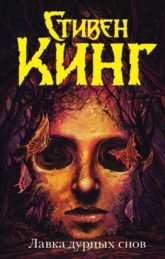 “Mile 81” 2011, ebook original
“Mile 81” 2011, ebook original
Every story in Bazaar comes with introductory comments from King on its conception, which is great for nerds like me. “Mile 81” was actually written around 1967 when King was at the University of Maine, Orono, driving back and forth on I-95 to see his girlfriend (the one whose break-up inspired Joyland). He lost the story, but later rewrote it in its entirety. This retro monster car story would feel at home in Night Shift with its monster laundry presses, its monster cars, and its monster toy soldiers, so it makes sense that it’s dedicated to Nye Willden and Doug Allen, the editor and publisher of Cavalier, the men’s magazine where King got his start publishing short stories.
“Premium Harmony” Nov. 9, 2009, New Yorker
Dedicated to Raymond Carver, this is one of three stories in this collection about people from the very bottom rung of the economic ladder. King’s portrayal of poor people these days feels out of focus because their poverty feels imitative, not lived, as if it’s something he read about in a magazine. I don’t think that distance exists because he’s rich, but because he’s old. Poverty today isn’t like the poverty he grew up with, and wrote about so richly in his earlier books, and the strain shows when he tries to bridge that gap. That said, this story has a nice snap to it, especially in the narrator’s baffled slightly aggrieved tone. But it’s not Carver. Not by a country mile.
“Batman and Robin Have an Altercation” September, 2012, Harper’s
Father-son stories are rare in King’s books. The big one, of course, is The Shining and we all know how that turned out. Since then, we’ve had The Dead Zone, “The Mist”, Desperation, and “Low Men in Yellow Coats” for stories about good father figures and their sons. Far more often we get Pet Sematary, “1922”, “Apt Pupil”, and Under the Dome with their monstrous daddies warping their sons, or we have From a Buick 8 where dad is dead from page one, leaving his son reeling. It’s a strange blind spot for a writer who has two sons, but this story adds one more semi-positive father-son story to the list. Dedicated to John Irving, for some reason, it’s actually a much more convincing story than anything so far in this volume, telling the tale of a son taking his senile father out for lunch and getting in a road rage incident. King’s refusal to sentimentalize either character is admirable: the dad is an asshole, senile or not, and the son can barely tolerate him but spends time with him out of a sense of duty. Speaking of duty, at one point King writes “Sanderson smells shit. His father has just dropped a load.” That kind of straightforward talk sums up in a single sentence why people either love or hate King: some of us appreciate his blunt honesty, others think it’s artless.
“The Dune” Fall, 2011, Granta
Dedicated to W.F. Harvey, the forgotten master of the horror short story, this is a supernatural tale right out of the EC Comics. An old judge is writing his will and tells his lawyer about a magic sand dune behind his house where he sees the names of the dead written in advance. Hampered by its unwieldy central device (a magic sand dune?), it still manages to wrestle a neatly done, subtly foreshadowed twist ending out of what is essentially a Twilight Zone story. The Eighties remake of The Twilight Zone, not the original.
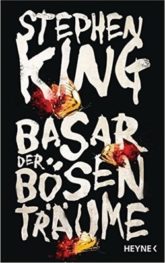 “Bad Little Kid” 2014, ebook in French and Germana
“Bad Little Kid” 2014, ebook in French and Germana
Previously only published overseas, this is a weird story. Longer than it needs to be, it’s basically a “what if” that goes, “What if Nancy’s friend, Sluggo, was evil?” Wrapped up in a death row confession that gives it a serious heft it doesn’t deserve, or know what to do with, its main monster is too goofy and unconvincing to carry a story about a guy who’s about to be executed. It’s as if Denis Villeneuve remade Who Framed Roger Rabbit? as a three hour meditation on mortality.
“A Death” March 9, 2015, the New Yorker
Dedicated to Elmore Leonard, this is a convincing version of one of Leonard’s Westerns, focused on Sheriff Barclay, a stoic man who seems constantly exhausted by doing the right thing, but does it anyways. Without the dedication to Leonard this would feel like one of King’s better short stories, and it’s definitely one of his best excursions into historical fiction. With the dedication, it feels like King has proven a point: he’s capable of flawlessly imitating Leonard’s style.
“The Bone Church” November, 2009, Playboy
King’s really going through the filing cabinet for old stories these days, what with “Mile 81” and this long narrative poem also first written when he was at the University of Maine. Read publicly by Jimmy Smith in 1968 or ’69, King rewrote this poem from memory in 2008 and it’s an essential part of his literary history. It’s a poem about explorers in a jungle finding a graveyard for ghost elephants and mostly dying along the way and it’s vintage King all the way — one guy gets his nose torn off like a “rotten peach” and another gets his brains eaten by a leech. It’s a crowd pleaser full of ghost stampedes, men going mad, people telling tales, and gore. Lots and lots of gore. You can hear the cheers and laughter of the crowd as each new gross-out invention lands hard, and I feel like the echoes of that acclaim stayed with King for years to come. Sitting in that coffeehouse crowd and hearing the audience go wild for every over-the-top twist may have helped make King the entertainer he is today, a writer motivated by visceral crowd response, not by a desire for literary acclaim.
“Morality” June, 2009, Esquire
Inspired by King’s days selling blood and shoplifting steaks to survive at the University of Maine, this is an overly complicated story about a couple who break up when they violate their personal morality for cash. King’s always prided himself on writing for money, but insisted that he’s never written a dishonest word, so it makes sense that a couple who violate their personal ethics would have no chance in his universe. Stark and unpleasant, there’s a puritanical streak in this story that’s not even leavened by his gleeful love of gore. I’m not sure if it’s a convincing wrestle with the Big Issues but it’s certainly an unpleasant one.
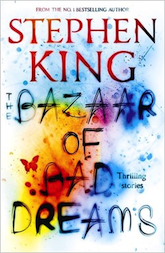 “Afterlife” June 2013, Tin House
“Afterlife” June 2013, Tin House
Another King story about death, his newest obsession worked out most recently in Revival, it’s about a guy who dies and finds himself sitting in an office talking to his afterlife case worker. Their banter gets a little silly, but the ending actually takes it in a surprising direction that’s kind of sweet. It’s dedicated to his absent friend, Surendra Patel, to whom he also dedicated Under the Dome.
“Ur” 2009, ebook
The novella in this collection that seems to find the most fans, it was sparked when King’s foreign rights sales agent, Ralph Vicinanza, tried to enlist King to write a promotional short story for the Amazon Kindle. King refused, then did it anyway. To me it feels labored and obvious, but this tale of a Kindle that reads books and newspapers from alternate realities, has found a lot of fans. And King got a pink Kindle out of it, so it’s not all bad.
“Herman Wouk is Still Alive” May, 2011, The Atlantic
Another of King’s stories about poor people that feels like something he got out of a New York Times feature, this attempt to fictionally re-enact the Diane Schuler accident is of a piece with King’s “A Good Marriage” which was fictional speculation about the life of Paula Dietz (formerly Paula Rader) wife of the BTK Killer. Balancing the awkwardly conceived poor women who get drunk and slam their minivan into an oncoming vehicle, are two elderly poets on their way to a reading and King’s story comes alive when he writes about them. Because it ends on his poets, it winds up finishing in a far more satisfactory way than it started.
“Under the Weather” 2011, Full Dark, No Stars paperback
This is a really fun story that hides its twist so well that when it’s revealed, and you see that it’s been staring you in the face all along, you want to laugh out loud. King doesn’t remember anything about getting the idea for this one or how long it took him to write, but he says that he had the ending first and had to carefully build back from there, which makes sense. Understated, not striving for any importance beyond its own pulpy thrills, it manages to be somewhat moving all the same. It’s as if the less King tries, the more his stories just naturally work.
“Blockade Billy” 2010, limited edition hardback
First published as a standalone novella with a cover by King’s regular cover artist for Hard Case Crime, Glen Orbik, this is a tribute to the rowdy, good old days of baseball. It works fine even for non-baseball fans, but you have to wade through a lot of baseball jargon and descriptions of games that blur into one big block of stats before it enters more familiar King territory. But all that extraneous detail falls away as King drives this thing to the finish line and by the time he crosses it you can see how well the storytelling engine works.
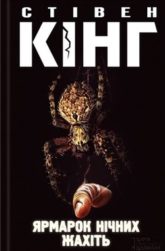 “Mister Yummy” previously unpublished
“Mister Yummy” previously unpublished
This is a story I have a hard time with, not because of any inherent qualities in the story itself. It’s actually a perfectly okay King story, one of those where an old man tells a story (see also: “1922”, Joyland, The Colorado Kid, The Green Mile, “Blockade Billy” etc.) and while it’s not totally compelling it has a small, interesting idea (the angel of death is a beautiful unattainable sex symbol) that King takes to its rational conclusion. But the narrator is a gay man and the story is about the AIDS crisis. When King told a friend he was writing this story they said, “I don’t think you’ve got anything new to say about AIDS, Steve…Especially as a straight man.” King’s response in his introduction? “No. And no. And especially: no.” He recoils, rightly, at the idea that an author can’t write from a point-of-view different than his or her own. Men can write women. White people can write black characters. Gay authors can write straight characters. Stories about America’s Japanese internment camps are not exclusively the province of Japanese American authors. But the danger his friend was warning him about, I think, was the risk of doing it badly and, in the process, perpetuating myths, half-truths, and lazy cliches, whereas a writer who grew up knowing that territory in their bones could have told their story with more originality and more spark. King’s gay characters aren’t caricatures, but they’re not very interesting, either. Maybe that’s his point? Either way, I don’t know why the story that King claims he wanted to write about “the brute power of the human sex drive”, needed to be about AIDS. Dedicating it to his friend, writer Michael McDowell, who died of AIDS-related complications, only further muddies the waters for me.
“Tommy” March, 2010, Playboy
Another poem, and not a bad one, so it’s two for two with the poetry in this book, a far cry from previous collections where the poetry has stood out for its stinkiness. Another tale told from the point-of-view of an old man (making it three in a row for geriatric narrators) it’s a narrative poem about the funeral for a gay hippie back in the Sixties. Where it gets good is when it widens its scope at the end to show us all the dead hippies, buried in their finery, sleeping in the earth in their bell bottoms and ponchos, an image that manages to be both macabre and poignant, simultaneously.
“The Little Green God of Agony” 2011, A Book of Horrors
Springing from those two or three seconds on a Maine road that turned into a two or three year recovery for King, this story is deeply rooted in the pain he lived with for so long. It’s informed everything from short stories (“N”, “Graduation Afternoon”) to novels (Dreamcatcher, Duma Key) and here it’s as if he’s teleported that understanding of pain back in time to the Stephen King who was cranking out down and dirty horror stories for the men’s magazines. How else to explain a meditation on pain, recovery, and human willpower that features someone macing themselves in the face, a demon god beaten to death with a broomstick, the sixth richest man in the world, and a sudden blackout? The fact that he can make it all work doesn’t make this an amazing story, but it does pay tribute to his skills as a writer.
“That Bus is Another World” August, 2014, Esquire
Reminiscent of Cujo, this short story about a guy coming to New York to bail his advertising agency out of trouble by landing a big account gets overlooked by a lot of reviewers. But the seed of the story is the simple glance King exchanged with a woman passing him in a bus as he was being driven to a reading, and to watch him conjure up that moment again, and then add a nasty little twist to its tail, is to watch a magician perform one of his tricks close-up, explaining exactly what’s up his sleeve, and you still can’t figure out how he picked your card.
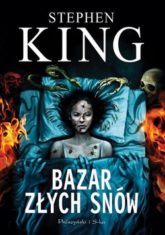 “Obits” previously unpublished
“Obits” previously unpublished
Lots of reviewers loved this story but anyone familiar with the horror genre will see its twists coming a mile away. You hope that they’re different this time, but except for their trappings, they aren’t. It’s about a guy who can cause people to die by writing their obituary. This has been a favorite chestnut of writers and moviemakers for years (King specifically cites 1958’s I Bury the Living in his introduction) and not a lot is new here except that the writer works for a poorly-researched version of Gawker that seems to operate like a Condé Nast magazine or one of the old men’s magazines. King just doesn’t know enough about how an operation like that functions to make his setting believable and sentences like “My first compu-stop at breakfast the next day wasn’t Neon Circus but Huffington Post” don’t help. He does take the ending in an unexpected direction, but it’s a slog getting there.
“Drunken Fireworks” 2015, audiobook
I can’t tell if I hate this story or love it. In this collection, King’s worst habits come to the fore when he writes about poor people and this story collects all the crummy dialect, tendency towards caricature, and unfunny jokes that he’s capable of in one place. The story of a poor family that wins enough money in the lottery to sit on their dock of their trashy vacation house and wage an escalating war of dueling fireworks displays with their rich neighbors across the lake isn’t bad, but it sure isn’t easy on the ears. King writes in his introduction, “Please don’t think of it as ‘local color,’ okay? That’s another genre I have no use for.” And yet that’s exactly what this is. Otherwise, I can’t think of a reason for it to exist.
“Summer Thunder” 2013, Turn Down the Lights
If this was the last story King wrote in his life, it would be fitting. It came to him in a flash of inspiration, and he wrote it in the same Maine cabin where the story is set. It’s an ode to his late, lamented 1986 Harley Davidson Softail that he gave up because he’s too old to ride it anymore, but it’s far more than a lament for a lost motorcycle. It’s an understated, gentle story about two men and a dog surviving the end of the world. Like the characters in Nevil Shute’s On the Beach, they’re already sick, now they’re just waiting to die. It’s got an elegiac feel to it, and ends on one of those Beckettian moments of “I can’t go on, I’ll go on” that pop up in King’s writing from time to time and resonate so beautifully. It’s a story about the dying of the light, but one that holds no regrets, just a quiet sense of mournful melancholy. And I’m grateful because it gives me the perfect place to end this reread.
Five years ago, I started rereading King with the story of a girl and her mother tearing each other apart. Sixty months later, I’m ending with the story of a man getting on his motorcycle and riding away into an uncertain future. Next week, let’s meet back here one last time to sum everything up and I’ll let you look at the numbers. Ever wonder how many characters in Stephen King stories are writers? How many are school teachers? I counted.
 Grady Hendrix is the author of Paperbacks from Hell, a history of the horror paperback boom of the Seventies and Eighties, as well as My Best Friend’s Exorcism, and Horrorstör.
Grady Hendrix is the author of Paperbacks from Hell, a history of the horror paperback boom of the Seventies and Eighties, as well as My Best Friend’s Exorcism, and Horrorstör.











I’ve really enjoyed reading your posts, Grady, even though I don’t care for King (other than the Dark Tower series). I hope you enjoyed writing them as much as I’ve enjoyed reading them.
I do need to point out a missed opportunity though. In your piece on Blockade Billy:
“as King drives this thing to the finish line” should be “as King brings this thing across home plate” – just sayin’.
.. and six years later, Herman Wouk is still alive.
Thanks for the Reread, Grady. It has been wonderful. Not lying, I’m going to miss beautifully crafted zingers like this: “Publications that had just been hailing him as America’s greatest storyteller treated this new collection like something America’s greatest storyteller had done on the carpet.”
A Stephen King writer count? If you include the short stories, that’s got to reach past one hundred…
I’m one of those people who thoroughly enjoyed Ur. I realize it’s not King’s best work, but it was just so much fun. I think I’m a sucker for getting limited views into alternate universes.
I liked Obits too…until the end which I remember felt like a cop out. Although now I can’t remember exactly what happened in the end.
Which is a lot of this book — Mile 81 really frustrated me because it felt so juvenile (and now realizing how young he was when he wrote it, I guess that makes sense)…but about half of these stories I just don’t remember any better than I do bad dreams a day or two down the road.
This was such a great observation: It’s as if Denis Villeneuve remade Who Framed Roger Rabbit? as a three hour meditation on mortality.